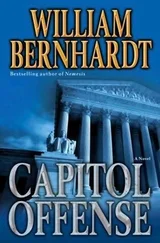“Because there are people who do not want the identity of the lady in question to be revealed. They will stop at nothing to prevent it. And they are swimming in resources. Money. Power. Armies to command.” He paused. “I can’t assure you that all of these minions will adhere to the same code of conduct that I do. Be very careful—danger may lurk in the most unexpected places.”
That sent a shiver down Loving’s spine. “Gotcha. Thanks for the tip.”
“It was my pleasure.” He extended a hand. “Best of luck to you.”
Loving couldn’t believe it, but he was actually shaking the hand of the man who had tried to kill him only hours before. “Very kind of you.”
“Not at all.” Leon looked up over the brim of his frothy mug. “You’re going to need it.”
17
Ishould’ve started down here, Ben thought, mentally beating himself up for having wasted so much time trying to find Senator Keyes in his office, or in one of the meeting rooms for his many committees—or heaven forbid, on the Senate floor. When a senator of his stature wanted time alone, away from the prying eyes of reporters or the outstretched hand of whatever constituent happened to be touring Washington that week, he retreated to his hideaway. Nestled in the subterranean basements of the three Senate office buildings, the hideaways did not appear on any of the tourist maps—or even on the official blueprints—but they were there, just the same. You had to know how to wind your way down the stairs and through the narrow corridors crowded with disused furniture and outdated equipment. You had to brave the suction and noise of an air-conditioning system more ancient than Methuselah. But the difficulty of the approach was part of the appeal; senators came here when they did not want to be found, sometimes for work, more often for pleasure. Given the tumult currently under way upstairs, Ben should have known to check the hideaways first; a senator of Keyes’s stature probably had three of them.
He caught the senator just as he was leaving, locking the door behind him. Inside the room, he could hear high-pitched, rather feminine giggling, but he decided not to ask. Keyes saw him, but he still turned away and started down the corridor.
“Senator Keyes! Could I have a few words?”
“Can you talk while you walk?” he replied, buttoning the vest of his three-piece suit around his ample girth.
“Ever since I was nine months old,” Ben muttered under his breath. Then, audibly: “I wanted to talk to you about the Roush confirmation hearings.”
Keyes checked his watch. “Main committee room. Ten minutes.”
“Yes, I know that. I wanted to talk about how you plan to conduct the hearing.”
“With my usual enthusiasm and bonhomie, I’d like to think,” Keyes said, smiling slightly.
They turned a corner, and the racket from the antiquated air-conditioning system became so loud Ben could barely hear. “I wondered if we could come to a few agreements in advance. About how the hearing will be conducted. How we’ll conduct ourselves.”
“Why? You’re not on the Judiciary Committee.”
“I’ve been asked to represent Judge Roush during the hearings. To act as his representative.”
“Isn’t that a conflict of interest? One of the people who will vote on his confirmation acting as his legal representative?” Keyes acted surprised, even though Ben was quite certain he wasn’t.
“But I won’t be acting as a lawyer. Not really. I’ll just be acting as his advisor. Since he’s unfamiliar with the ways and procedures of the Senate.”
“Ah. Clever work-around.” He winked. “I thought your fearless leader was going to run interference for him.”
Ben assumed that was a reference to Minority Leader Hammond. “We’re both working with Thaddeus. He’s going to be helping me with—”
“Even so, this seems quite a high-profile position for a first-term not-really-a-senator.”
They reached the foot of the stairs. There would be reporters waiting at the top in the gallery, and once Keyes felt the embrace of a klieg light Ben knew he would have no chance of talking to him. He took hold of the man’s arm and held him back. “I wanted to see if we could come to an agreement about these hearings. Before we’re forced to start performing for the cameras.”
Keyes looked down at him, one eyebrow cocked high. “All right. What did you have in mind?”
“I assume we both want a dignified and expeditious confirmation process.”
“You assume a lot.”
“I hope we will both remember the constitutional role of the Senate in this process. To advise and consent.”
“The Constitution and I are well acquainted, Senator Kincaid.”
“It’s not an excuse to engage in personal attacks.”
“Heaven forfend.”
“No McCarthyite tactics.”
“Perish the thought.”
“No prying into the nominee’s private life.”
“Well…there are times when a nominee’s private life becomes relevant. Certainly your party found it very relevant when Clarence Thomas was nominated.”
“No one’s going to be bringing sexual harassment charges against Thaddeus Roush and we both know it.”
“Mr. Kincaid, you seem to be assuming I will be hostile to Judge Roush. May I remind you that he is a member of my party, and was nominated by a President who is a member of my party?”
“Don’t waste your breath. I know perfectly well the President wants this nomination killed.”
“I didn’t get that memo.”
“So your staff hasn’t been taking my fellow senators’ temperature regarding a possible Haskins nomination?”
Keyes turned slowly, his eyes widening.
“When the media-darling wife-and-baby-saving judge from Colorado flies to Washington and visits the President,” Ben added, “it suggests that someone is lining up a successor.”
“Nonsense. The President just wanted to formally acknowledge Judge Haskins’s achievements. The man is a national hero.”
“And the President could use a national hero. Just as soon as Roush’s nomination goes down in flames.”
“It’s hardly a crime to consider alternatives, Ben. Especially when the current nominee’s ‘partner’ is being interrogated in connection with a murder.”
“That sounds to me like a good reason to delay the hearing. Not to rush it forward.”
“Delay is not an option.” Keyes was quiet for a moment, then shrugged, apparently deciding that denials were not worth the effort. “You could hardly blame the President for forging ahead. Most pundits expect this nomination to fail, and his days in office are limited. If we don’t move forward quickly, he might not have a chance to select the next nominee.”
“This nomination doesn’t have to fail. It shouldn’t fail.”
“Some things are outside our control.”
“I’m not sure I think anything’s outside your control. At least as it relates to the Senate Judiciary Committee. You could stop the character attacks and the tabloid testimony cold if you wanted.”
“We still have many questions—”
“You already have Roush’s written answers to your interrogatories.”
“Pitiful. Haven’t seen a more evasive, less informative bunch of hogwash since Harriet Miers. And you know what happened to her.”
“Mister Chairman, I am well aware that you run this committee, at least with regard to the Republican members.”
“I’m only the chairman, Kincaid. Not the gatekeeper. I can’t prevent other senators on the committee from raising issues—”
“You can, and we both know it. That’s how it’s done. You get other party loyalists to do your dirty work so you can retain the appearance of impartiality.”
Читать дальше








